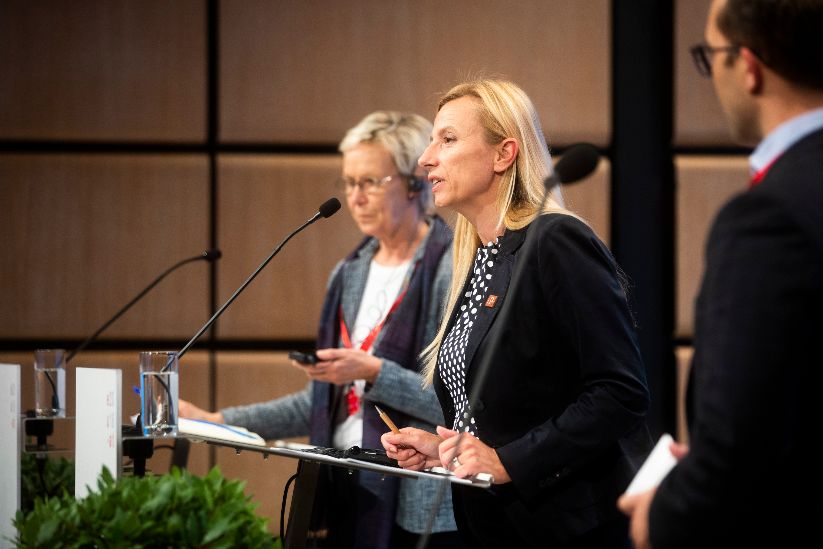
Federal Minister Bogner-Strauß: Making Gender Equality Visible on the EU’s Agenda
Informal meeting of EU gender equality ministers – member states sign joint declaration
“During its presidency of the Council of the EU, Austria aims to initiate an open and future‑oriented debate on gender equality”,
said Federal Minister for Women, Families and Youth, Juliane Bogner-Strauß, at the conference on “Gender Equality and YOU. Young Voices. Joint Initiative”. Three events were held in Vienna on 11 and 12 October to address the subject of gender equality.
“I would like to make the issue of gender equality visible in the EU again”,
the Federal Minister said.
“The European Commission puts gender equality high on the agenda”, said Tiina Astola, Director-General for Justice and Consumers at the European Commission. “I am extremely grateful to Juliane Bogner-Strauß for her attention and commitment to advance gender equality.”
Joining the EU ministers at this dialogue-oriented conference were experts from the EU member states’ administrations, along with representatives from the Western Balkan states and the European Free Trade Association (EFTA).
Highlighting and strengthening gender equality action
The “Gender Equality and YOU. Young Voices. Joint Initiative” conference addressed the future priorities for work on gender equality issues, with the aim of providing genuine support for their implementation. Young people and youth representatives were also actively involved in the event, as were representatives from various NGOs.
“This is providing a more visible and more audible platform for young people’s ideas and needs”,
said Bogner-Strauß.
“I think that this rather remarkable setting is a good example of how to build strong networks and foster continuous dialogue in the field of gender equality – which is also one of the topics of today's conference“,
said Tiina Astola.
There is a clear common strategy and a corresponding institutional structure for many policy areas in the EU; in the area of gender equality, however, there is no dedicated high-level strategy and therefore no common strategic framework. Compared to many other issues, there is less of a distinctive institutional network and regular dialogue between the relevant actors in policy and administration in this area. The Federal Minister explained that, for this reason, “a new, distinct gender equality strategy for the years after 2019 is indispensable in order to create a commitment and send out the right message.” She added that this kind of EU gender equality strategy could ultimately serve as a reference point for the EU institutions and provide guidance for the member states.
Impetus for new EU gender equality strategy
“The aim of the gender equality events during the Austrian Presidency of the Council of the European Union is to stimulate an initial discussion of this issue and to provide the impetus for a new EU gender equality strategy”,
said Juliane Bogner-Strauß. A joint declaration on “gender equality as a priority of the European Union today and in the future” was signed during the informal EU ministerial meeting in order to raise the profile of gender equality on the EU’s political agenda. Austria submitted this declaration jointly with Estonia and Bulgaria, its partners in the trio presidency. Additionally, several other member states have also signed the declaration on promoting gender equality in the EU. The declaration serves as a powerful sign of the collective efforts towards gender equality in the EU.
The opportunities of digitalisation
At an informal breakfast, the subject of digitalisation was also explored, and experiences and ideas were discussed. One of the core questions addressed by the Austrian Presidency of the Council of the European Union is the kinds of opportunities and risks digitalisation offers for young women and girls and for young men and boys. The European Institute for Gender Equality presented the findings of the report “Gender equality and youth: opportunities and risks of digitalisation”. Bogner-Strauß explained that “digitalisation accompanies us today in all areas of life and society”, hence the importance of analysing the different implications of digitalisation for women and men, as well as girls and boys.
“Both genders must benefit equally from the opportunities and possibilities that digitalisation offers. This requires more knowledge and a greater awareness of the gender-specific implications, as well as targeted management to promote gender equality,”
the minister concluded.
More information about the informal meeting of gender equality ministers can be found on the event page.
More information about the "Gender Equality and YOU" conference can be found on the event page.
Spokesperson for the Federal Minister
Herbert Rupp
+43 1 53 115-63 34 04
herbert.rupp@bka.gv.at